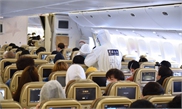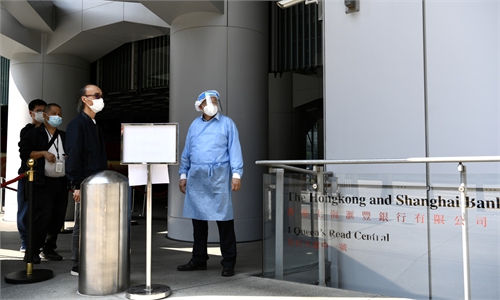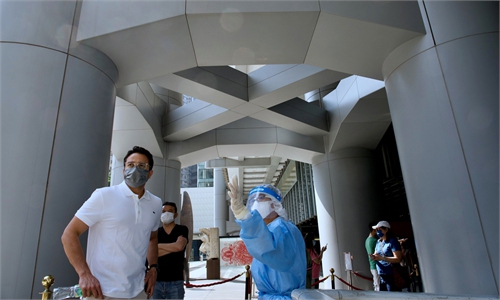IN-DEPTH / IN-DEPTH
Foreigners, overseas Chinese share personal experiences of entering China amid COVID-19, refute Western media’s ‘inhumane’ claims
Foreigners reveal truths behind their quarantine experiences amid global pandemic
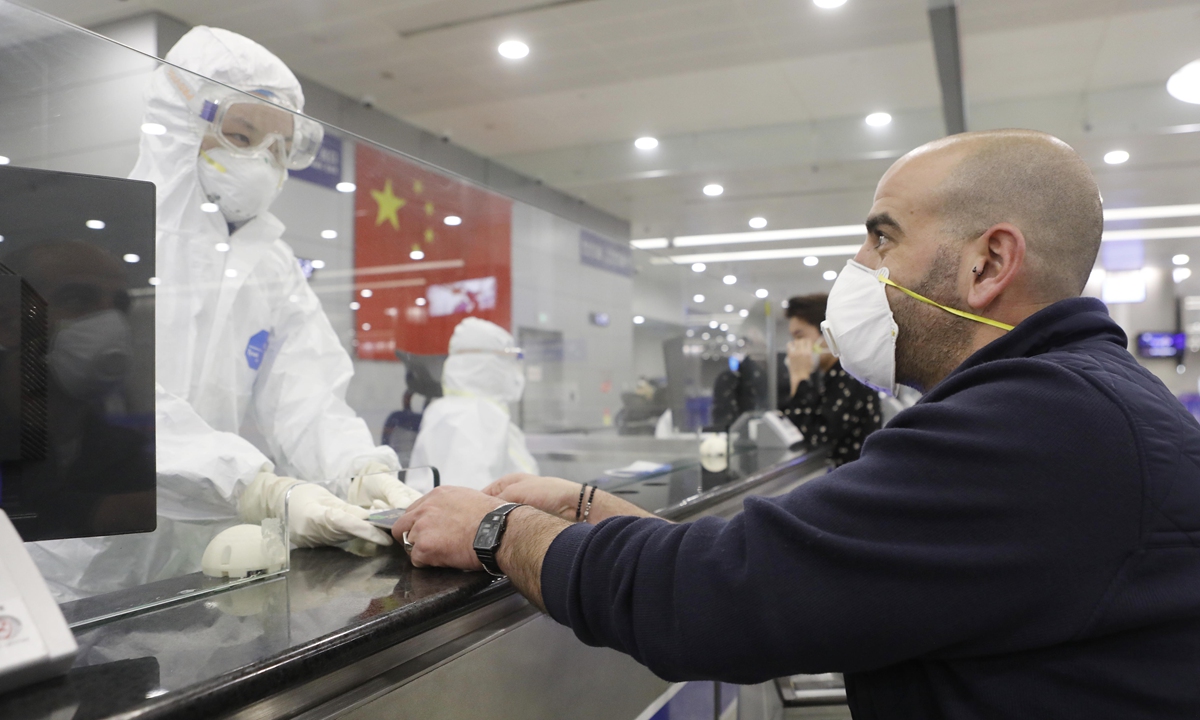
A border inspection officer in Shanghai returns a passport after confirming an arriving overseas passenger's personal information on March 9, 2020. Photo: VCG
For her 45th birthday, British national Aimee Swann didn't expect to celebrate it while in quarantine at a hotel in Guangzhou, South China's Guangdong Province, after entering China with her two daughters, both under the age of four.
To Swann's surprise, the hotel staff gave her a birthday cake that day, which to some extent comforted her as she was thousands of miles away from other family members.
"Quarantine for safety, but never disconnect the love!" Swann told the Global Times, saying she felt the warmth and care of China toward foreign arrivals during the COVID-19 pandemic.
Along with Swann, those with experiences of entering and quarantining in China in the past months may be confused by words like "draconian" or "inhumane" that some Western media have used to describe China's entry policies amid the COVID-19 pandemic, which are obviously not consistent with the facts.
The New York Times, for instance, claimed in a March 24 article that China's entry restrictions ask visitors to leave children behind, receive anal swab tests, and be quarantined for up to one month, exaggeratedly depicting China as a selfish country that "separates families" and "disenfranchises people who are big China fans."
Foreign visitors reached by the Global Times refuted such claims. Swann said that she appreciated the help she received from the Chinese staff during the quarantine. She asked the hotel for a suite with two bedrooms to be together with her daughters. "The hotel didn't have one for the first few days, but then one became available and they moved us there as soon as possible," Swann recalled.
Rachel George arrived in Xiamen, East China's Fujian Province, from the US last October. She told the Global Times that she was very impressed by how China managed the entire process. "I felt safe and taken care of; very smooth, and as enjoyable as the quarantine could be," she said.
Real entry experiences
China has opened its doors to tens of thousands of foreigners amid the pandemic. It provided quarantine services to approximately 125,000 foreigners coming to China in 2020 alone, according to statistics released by the National Immigration Administration in January.
Several foreigners and overseas students reached shared with the Global Times the details of them entering China amid the pandemic. Their stories, having occasional twists and turns though, don't sound as "extremely difficult" as a few Western media outlets hyped.
"Everything was quite a smooth process once I landed in Shanghai. It was quick and very efficient," Keira Hart, a 38-year-old teacher from Nottingham, the UK, told the Global Times on Monday. Hart took a throat and nasal COVID-19 test at the airport in Shanghai and another one before she was discharged from a 14-day quarantine at a hotel last November.
Hart said she didn't feel the paperwork for the visa application was complicated as her employer, a local kindergarten, prepared all the filings well. "I think the process from my school applying took only a few weeks," she said.
George had her PU letter (an invitation letter) prepared by her employer in China, in addition to presenting a COVID-19 test report valid for 48 hours before her flight to China which was "perhaps the most stressful part of the journey," she commented.
Hart recalled that it took around four hours from landing in Shanghai to arriving at the quarantine hotel. "Once inside, the airport was very organized, set up as a one-way system to walk through each step, filling forms and [taking] COVID-19 tests," she said. "There are signs to explain and plenty of staff to help."
Hart paid 7,000 yuan for the 14-day quarantine hotel, food and tests included. "The fee is very reasonable," she told the Global Times.
For Swann who quarantined with kids, the hotel staff in Guangzhou also made efforts to help. "They sent up a kids play kitchen set and also sent free fruits. They were extremely helpful and kind," Swann said. During the quarantine, Swann was put in touch with a local supermarket that delivered anything she needed within one hour.

Aimee Swann's daughters holding the kids play kitchen set gifted to them by a quarantine hotel in Guangzhou Photo: Courtesy of Aimee Swann
Candy Perez and her family flew back to their home in Beijing from the US six months ago. Far from how several Western media outlets attempted to depict quarantine facilities, she said that centralized facilities selected by the government are modern facilities - often good hotels converted for quarantine purposes - with every modern convenience one might need."The hotel had internet and a few cable channels which showed movies in English. Meals were very local so my kids ate a lot of rice and sometimes meats. We did get a bottle of soy sauce from the catering provider which was nice. Sometimes the caterer would give us Coca-Cola or sprite with dinner," Perez told the Global Times.
None of them were subjected to anal swab tests during their quarantines in China. George recalled she had "three blood tests, three nose swabs, one throat swab, and daily temperature checks" during her isolation in Xiamen. These tests and checks were "as comfortable as they can be," she said to the Global Times.
On the Chinese side, many airports said they started to implement a set of strict procedures since March 2020 to make the whole entry process for visitors scientific and reasonable.
"There are specific parking stands for international flights landing at the airport; and a nucleic acid testing room has been set up, which is a special area for one-stop testing," said an interpreter surnamed Li, who has worked on the front line of the pandemic control in Xi'an Xianyang International Airport in Northwest China's Shaanxi Province.
Local authorities hired interpreters to help foreigners, Li said. "After foreign passengers arrive, we follow their vehicles back to the quarantine hotels and provide them with translation services during the whole process," he told the Global Times.
For the overseas Chinese nationals, Chinese embassies and consulates don't encourage them to return amid the pandemic for the sake of virus control but have never obstructed them from returning home.
Wu Sheng is one of the overseas Chinese students who flew back in February from Los Angeles. He doesn't agree with the assertions by the New York Times and some other Western media outlets that China impeded their return.
Wu said his application procedure (of flying back) was not tedious, and his entry process - including body temperature measuring, throat swab testing, nasopharyngeal swab testing, blood sampling, and filling of a declaration form - "all the steps were arranged in an orderly way," he told the Global Times.
Chinese experts believe it is still very necessary for China to implement entry restrictions taking the current global pandemic situation into account. The overseas spread of COVID-19 hasn't been brought under control with relatively looser policies by foreign authorities and the occasional emergences of the virus variants, said Zhou Zijun, a professor at Peking University's School of Public Health.
The Chinese mainland reported five new confirmed imported cases on Tuesday, adding the total number of imported cases to 5,290 since the virus outbreak. Infected passengers of internationalflights have frequently triggered the aviation authority's "circuit-breakermechanism" and caused public concern on virus transmission risks brought by the imported cases.
For China, where there has been almost no local COVID-19 case for months - except for the latest surge at a Chinese-Myanmar boarder city which saw six locally transmitted cases and three asymptomatic cases as registered on Tuesday - and given herd immunity is yet to be achieved through vaccinations, "the primary task remains preventing imported infections," Zhou told the Global Times.
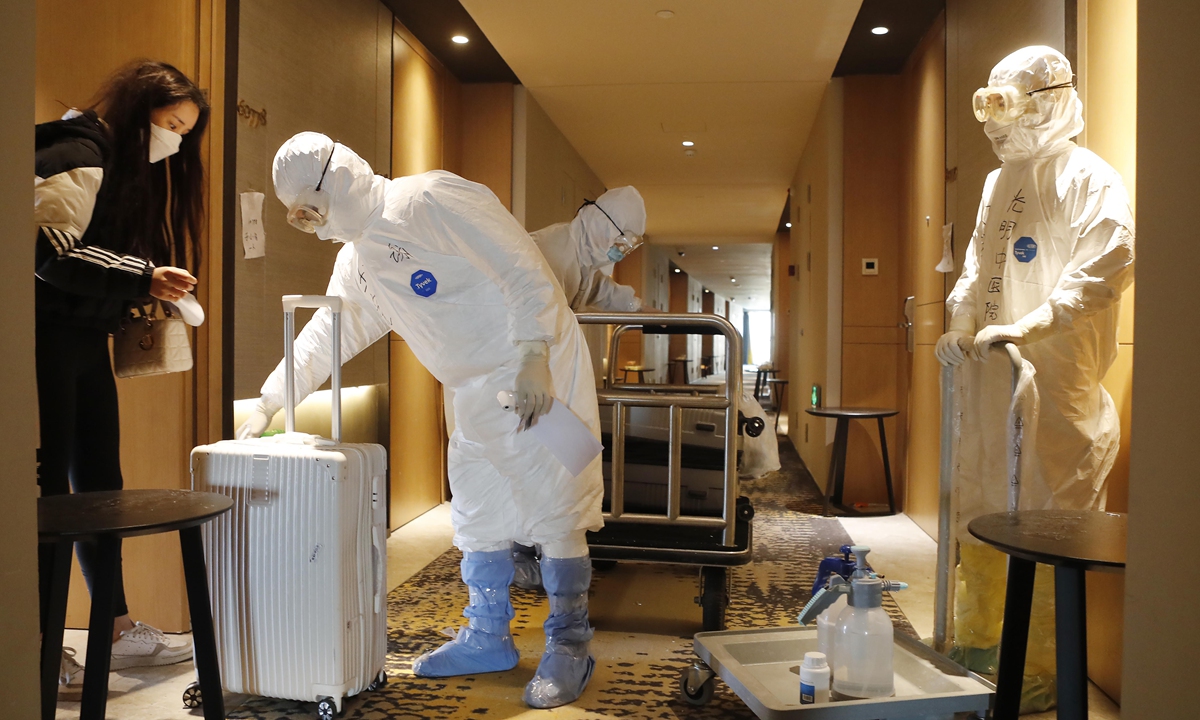
Staff disinfect the luggage of a passenger set to be released from quarantine at a hotel in Shanghai on March 16, 2020. Photo: VCG
Who can enter China?
China, similar to most other countries around the world, has placed anti-epidemic restrictions on people entering the country taking the severe global pandemic situation into account.
It nonetheless allows those with real need who meet China's COVID-19 prevention control requirements to come during the pandemic, instead of simply keeping the door closed, observers said.
At present, according to the latest policies, the foreigners who can enter China include those holding diplomatic, official, courtesy, and C visas; those holding permanent residence permits in China; those holding valid residence permits for work, personal affairs, and reunions in China; and those holding visas issued amid the pandemic after March 28, 2020.
For the foreigners with residence permits for work, personal affairs, and reunion purposes that have expired since March 28, 2020, have been able to apply for new visas to enter China since September 28, 2020, said an official notice released on September 23, 2020.
There were also people from certain countries being halted from entry into China for some time due to their then serious domestic epidemic situations. On December 24, 2020, China announced the suspension of flights to and from the UK due to a new coronavirus variant there, after several countries had announced similar measures such as closing borders and banning flights from the UK.
In general, China has been providing more conveniences to visitors from visa applications to after-entry quarantines as the global pandemic situation gradually improves. The latest policies it announced in mid-March no longer ask for invitation letters or negative COVID-19 results from some foreigners and their relatives who have been inoculated with Chinese-made COVID-19 vaccines in their visa applications.
The policies also expand the scope of visa review and issuance for people coming to China due to emergency humanitarian needs, such as family reunions, attending funerals, or visiting critically ill relatives.
China is also working on offering entry conveniences to those being inoculated with non-Chinese COVID-19 vaccines, said the Chinese Foreign Ministry on March 23. "China has been in close communication with other countries to discuss a reciprocal arrangement for vaccination," said spokesperson Hua Chunying that day. "As long as a measure helps to prevent and control the pandemic and facilitates interpersonal exchanges, we are open to it."
On whether the entry and quarantine process was particularly easy for her and her family, Perez admitted to it being hard but also called it necessary.
"I think it was necessary for China to implement [the anti-epidemic measures], as much as I didn't enjoy the process," Perez said. "It was quite strict but, when you're attempting to control a pandemic there's no margin for error," she said.
Earlier in March, American vlogger, Jerry Kowal released a video showing how he flew from New York to Shanghai via San Francisco. In the video, which has had more than 10 million views on China's Twitter-like Weibo, Kowal praises China as it has "the best organized" COVID-19 prevention in the world, saying he "feels a sense of freedom" after arriving in China.
The current stable epidemic situation in China is owed to its months of persistent COVID-19 prevention efforts, Zhou said. He predicts that China may further loosen entry restrictions for foreigners at the end of this year when China will have basically achieved herd immunity after 60-70 percent of the population is vaccinated.
"Foreign countries, instead of being busy with pointing fingers at China's virus prevention, should spend more effort on controlling their domestic epidemic to reduce the risks of exporting the virus abroad," Zhou noted.
